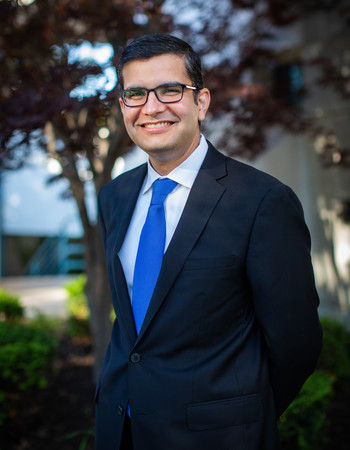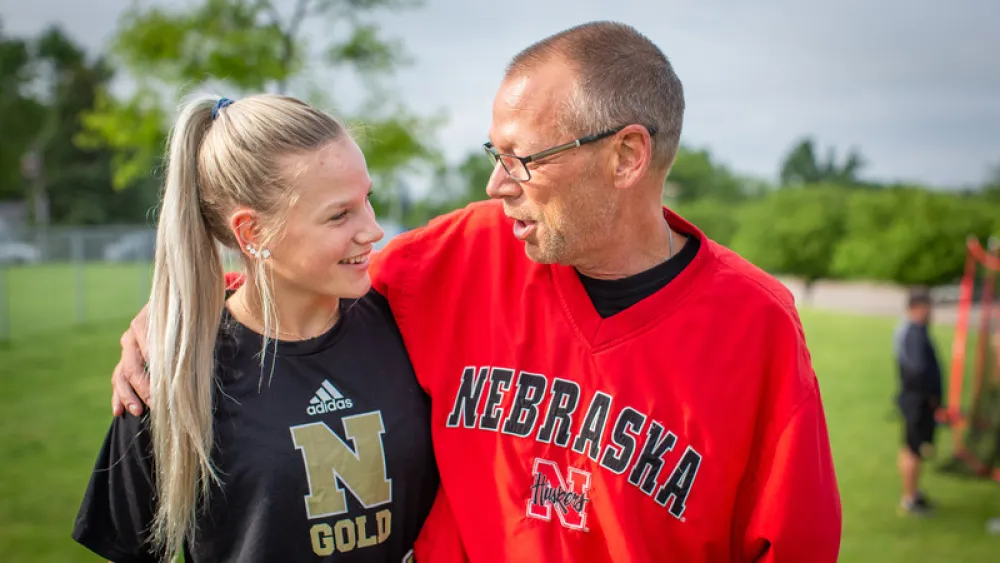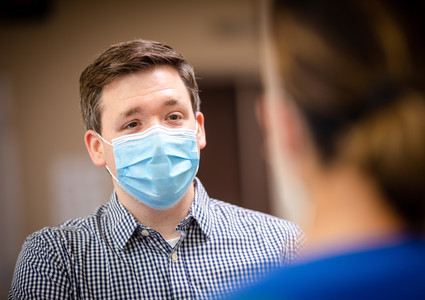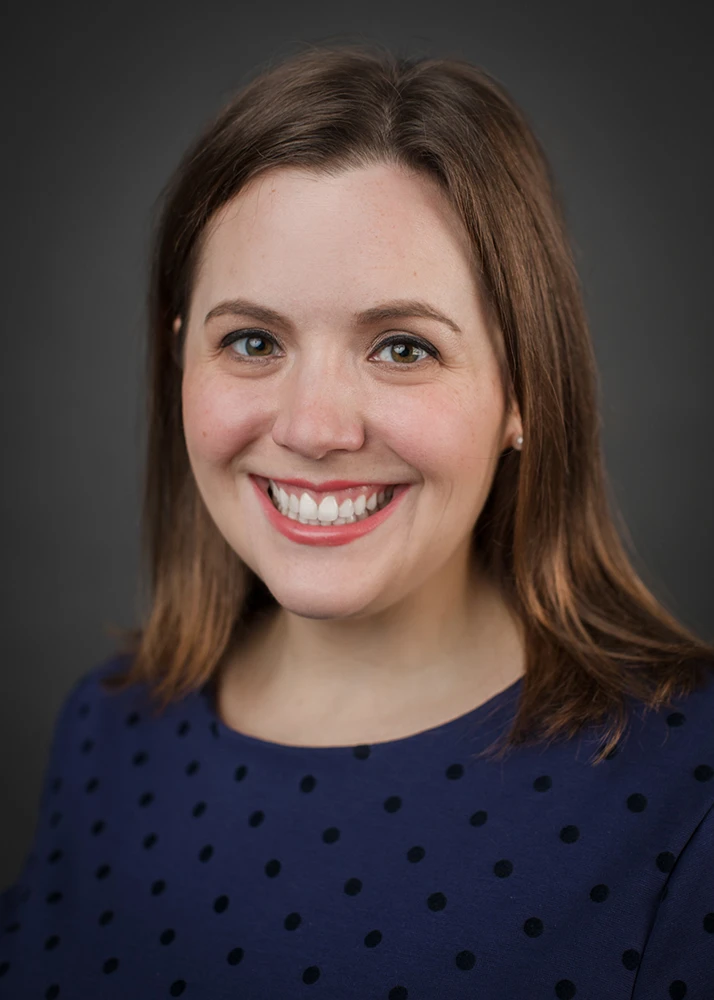
The Meaning of Care Magazine
The Vaccine That Prevents Cancer
Published: Aug. 24, 2021

In May, 52-year-old Mark Schmidt greeted friends and cheered on his 16-year-old daughter, Sam, at a softball tournament at La Vista City Park.
It was a return to the same fields where, two years earlier, the Hastings, Nebraska, man watched Sam play for the first time after he completed seven weeks of chemotherapy and radiation at Methodist Estabrook Cancer Center (MECC) in Omaha.
In November 2018, Mark was diagnosed with oropharyngeal cancer – he had a tumor on his neck and another at the base of his tongue. He was shocked when told his cancer was related to a human papillomavirus (HPV) infection.
“I had never even heard of HPV,” he said.
Mark learned that there was an HPV vaccine that could prevent his three children from developing six types of cancer – including his – decades from now. They each received their first dose within two weeks of his diagnosis.
The HPV vaccine is approved for everyone ages 9 to 45 and is especially recommended for children ages 11 to 12 – when their bodies will have the strongest immune response and before they become sexually active. But when it comes to administration, it trails routine adolescent vaccines like those for meningitis, tetanus, diphtheria and pertussis by nearly 40% nationally.
Methodist Health System is aiming to close that gap locally through a systemwide partnership with the American Cancer Society (ACS). In November, the ACS designated Methodist a Communities of Practice (COP) site – the only health system in Nebraska and Iowa and one of only six COP sites across the country focused on HPV vaccinations. With a three-year grant funded by the Centers for Disease Control and Prevention (CDC), Methodist’s multidisciplinary HPV task force is building on its existing efforts to vaccinate children against HPV, standardize education among providers and normalize the conversation about the vaccine with families.
What Is the HPV Vaccine?
The cancer-preventing HPV vaccine is not new – over 120 million doses have been distributed in the U.S. since 2006. It could protect against 90% of HPV-related cancers by preventing the infections that cause those cancers.
HPV is the most common sexually transmitted infection (STI) in the U.S., and 85% of people will be infected in their lifetimes. Testing is only available for people with a cervix, which means millions of people are silent carriers. Most infections go away on their own, but those that don’t cause nearly 44,000 cancers each year, including:
- Cervical, vaginal and vulvar
- Penile
- Anal
- Throat (including tonsil and base of tongue)
Protecting her children from cancer is the reason Theresa Cole of Omaha sat in a Methodist Physicians Clinic exam room with her sons DJ, 12, and Braylen, 11, in June. She thought the HPV vaccine was only for girls. But when her family’s pediatrician, Elizabeth Walenz, MD, of Methodist Physicians Clinic, told her that boys need the vaccine, too, Theresa didn’t hesitate to vaccinate her sons.
“If a vaccine can reduce the possibility of cancer for my kids, it’s a no-brainer for us as parents,” she said.
HPV Task Force
Although HPV is commonly associated with cervical cancer, a recent study found that from 2001 to 2017, cervical cancer cases steadily declined as other HPV-related cancers increased. Researchers also found that 40% of HPV-related cancers occurred in men.

Methodist head and neck surgical oncologist Aru Panwar, MD, said that preventing these cancers requires collaboration across disciplines. In 2019, he helped create Methodist’s HPV task force, which brings together physician champions from head and neck surgical oncology, gynecologic oncology, pediatrics, adolescent gynecology, and colon and rectal surgery.
“I’m proud because we’re not just focusing on cervical cancer,” said Methodist gynecologic oncologist Niyati Nadkarni, MD. “I think it’s extremely rare to see an approach looking at HPV from all different perspectives.”
A large focus has been standardizing provider education across the system, particularly among pediatric and family medicine providers, who sometimes run into hesitancy from parents.
“A small percentage of parents adamantly refuse the HPV vaccine for their child,” said Methodist Physicians Clinic pediatrician Matthew Gibson, MD, who’s led provider education workshops. “There’s a bigger percentage who are hesitant because they don’t know enough about it. If there’s not enough of a push from their doctor, they don’t do it.”
As part of its work with the ACS, Methodist is pushing to vaccinate 9- to 13-year-olds and will regularly evaluate data to share best practices among clinics. Future initiatives will involve outreach efforts and collaboration with the Douglas County Health Department and Nebraska Department of Health and Human Services.
Andy Link, the ACS’s cancer control strategic partnerships manager, said that Methodist was selected as a COP site for its mission to improve the health of its communities and for its reach – the ACS is working with 27 Methodist Physicians Clinic locations in Nebraska and Iowa.
“It speaks to Methodist’s commitment to helping our communities be healthy and productive,” Dr. Panwar said. “We’re here to tend to their needs from prevention through cure. We’re thinking about the future of health care for Nebraskans and Iowans.”
Narrowing the Gap
Despite the protection the HPV vaccine provides, in 2019 only about 54% of U.S. teens were fully vaccinated, compared to rates around 90% for school-mandated vaccines.

“I’ve got two boys,” Dr. Gibson said. “If I weren’t a pediatrician, if I’m in the office with my kids and the doctor says, ‘We have a vaccine that’s going to prevent multiple types of cancer that your child could have when they’re an adult,’ I think people would be breaking down your door to get it.”
Dr. Gibson said that sometimes hesitancy stems from a stigma surrounding the HPV vaccine: Parents are uncomfortable vaccinating their 11-year-old against an STI and fear they’re giving them permission to have sex.
“This is not the same conversation,” Mark said. “This is just helping prevent your child from getting cancer. You can still have that conversation about your values from a sexual standpoint.”
“The HPV vaccine has nothing to do with sex,” said Monica Bumpus, 56, of Omaha. “It’s about protecting your kids.”
Monica, a patient of Dr. Nadkarni's, was first diagnosed with cervical cancer in May 2017 and has been in and out of remission since. She urges vaccination for children – and for eligible adults who could protect themselves against new infections.
“This is very, very silent,” Monica said. “It affects more than just yourself. It affects your whole family. If a simple shot could prevent it, why wouldn’t you?”
While herd immunity is a more distant goal, there are signs that the HPV vaccine is already working. Infections with HPV types that cause HPV-related cancers and genital warts are down 86% among teen girls and 71% among young adult women.
“If you could get a vaccine that stopped lung cancer, everyone would – even though most of us aren’t smoking or at high risk,” Dr. Gibson said. “This is the same approach. We know the HPV vaccine is safe. We know it’s already being effective. We know that it’s going to keep working.”
HPV Vaccine Recommendations
- Children ages 9 to 14 need two doses, spaced six to 12 months apart.
- A third dose is need for people ages 15 to 26.
- Adults ages 27 to 45 should consider the vaccine and talk to their provider.
- The HPV vaccine can be administered at the same time as the COVID-19 vaccine.
Photos by Daniel Johnson
More Resources
- Learn more about the HPV vaccine and HPV-related cancers from the CDC.
- Find a provider for your child and call today about scheduling the HPV vaccine.
- Is your child uninsured or underinsured? Learn how they can get the HPV vaccine at no cost through the Vaccines for Children Program.
- If you’re an adult seeking financial assistance for the HPV vaccine, learn more about the Merck Patient Assistance Program.
- Read more from the summer 2021 issue of The Meaning of Care Magazine.


